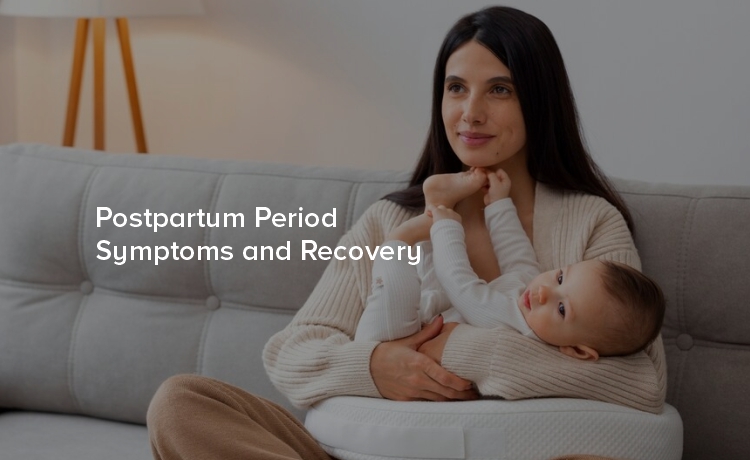
The weeks following childbirth are a unique blend of awe, exhaustion, and discovery. Known as the postpartum period, this time ushers in a series of changes that are as challenging as they are rewarding. Whether you're a first-time mom or adding another bundle of joy to your family, understanding postpartum symptoms and recovery can ease your transition into motherhood.
The postpartum period, also known as the puerperium, begins immediately after childbirth and typically lasts for six weeks. During this time, your body undergoes significant changes as it returns to its pre-pregnancy state. Hormonal shifts, physical recovery, and emotional adjustments all play a role in this complex transition.
Physically, your uterus starts to shrink back to its normal size, and you may notice postpartum bleeding known as lochia. This is your body's way of shedding the lining of the uterus and can last for several weeks. It's a natural part of recovery and gradually decreases over time.
Emotionally, the postpartum period can be a rollercoaster. Hormones like estrogen and progesterone, which were at high levels during pregnancy, drop sharply after birth. This hormonal shift can contribute to mood swings, anxiety, and even postpartum depression in some cases. Recognizing these symptoms and seeking support is crucial for your mental health.
Physical Discomfort and Changes
After childbirth, your body may experience various physical discomforts. Soreness and fatigue are common as your body recovers from the demands of labor and delivery. You may also notice pain or discomfort in your perineal area, especially if you had a vaginal birth with stitches.
Breast engorgement is another common symptom, occurring when your milk comes in a few days after birth. This can lead to swollen, tender breasts, but regular breastfeeding or expressing milk can help alleviate discomfort.
Additionally, constipation and hemorrhoids may persist after delivery, often exacerbated by the strain of pushing during labor. Staying hydrated, eating a fiber-rich diet, and gentle exercise can aid in easing these symptoms.
The postpartum period can bring about a mix of intense emotions. Baby blues, characterized by mood swings, tearfulness, and irritability, affect many new mothers. These feelings typically subside within two weeks, but ongoing symptoms may indicate postpartum depression.
Postpartum depression is more severe and long-lasting, affecting your ability to care for yourself and your baby. If you experience persistent sadness, lack of interest in activities, or feelings of hopelessness, it's essential to reach out to a healthcare provider for support and treatment.
Anxiety is also common in new mothers and can manifest as excessive worry or fear about your baby's health and well-being. Learning relaxation techniques and seeking reassurance from loved ones can help manage these feelings.
Rest and Self-Care
Prioritizing rest is crucial during the postpartum period. Sleep deprivation is common with a newborn, so try to rest whenever your baby sleeps. Accepting help from family and friends can also lighten your load and give you more opportunities to rest.
Self-care is vital for your physical and emotional well-being. Simple practices like taking warm baths, staying hydrated, and eating nutritious meals can aid your recovery. Remember, taking care of yourself is not selfish—it's essential for your ability to care for your baby.
Incorporating gentle exercises, such as postpartum yoga or walking, can improve your energy levels and mood. Always consult your healthcare provider before starting any exercise routine to ensure it's safe for your stage of recovery.
To manage postpartum bleeding, use sanitary pads rather than tampons until your healthcare provider gives you the green light. Monitor the flow and color of your bleeding and reach out to a doctor if you experience heavy bleeding or large clots.
For perineal discomfort, cold packs and sitz baths can provide relief. Over-the-counter pain relievers like acetaminophen or ibuprofen can help alleviate soreness, but always consult your doctor before taking any medication.
If you experience breast engorgement, breastfeeding frequently or expressing milk can ease discomfort. Applying warm compresses before feeding and cold compresses afterward can also help.
Maintaining your emotional well-being is just as important as physical recovery. Reach out to loved ones for support and share your feelings with trusted friends or family members. Joining a new mothers' support group can also provide a sense of community and understanding.
If you suspect postpartum depression or anxiety, don't hesitate to seek professional help. Therapy, counseling, and medication (if necessary) can offer relief and help you regain your emotional balance.
Healthcare Providers
Your healthcare team is there to support you throughout your postpartum recovery. Attend follow-up appointments to monitor your health and address any concerns. Discuss any physical or emotional symptoms you may be experiencing to receive appropriate guidance and treatment.
If you're unsure where to start or feel overwhelmed, don't hesitate to reach out to your healthcare provider for referrals to specialists or support services.
If you're struggling with postpartum depression, anxiety, or other mental health challenges, consider seeking help from a mental health professional. Therapy or counseling can provide valuable tools to manage your emotions and improve your overall well-being.
Remember, seeking help is a proactive step toward ensuring your emotional health, and it's essential for your ability to care for yourself and your baby.
The postpartum period is a time of profound change and adjustment. By understanding the symptoms and taking proactive steps toward recovery, you can ease your transition into this new chapter of life.